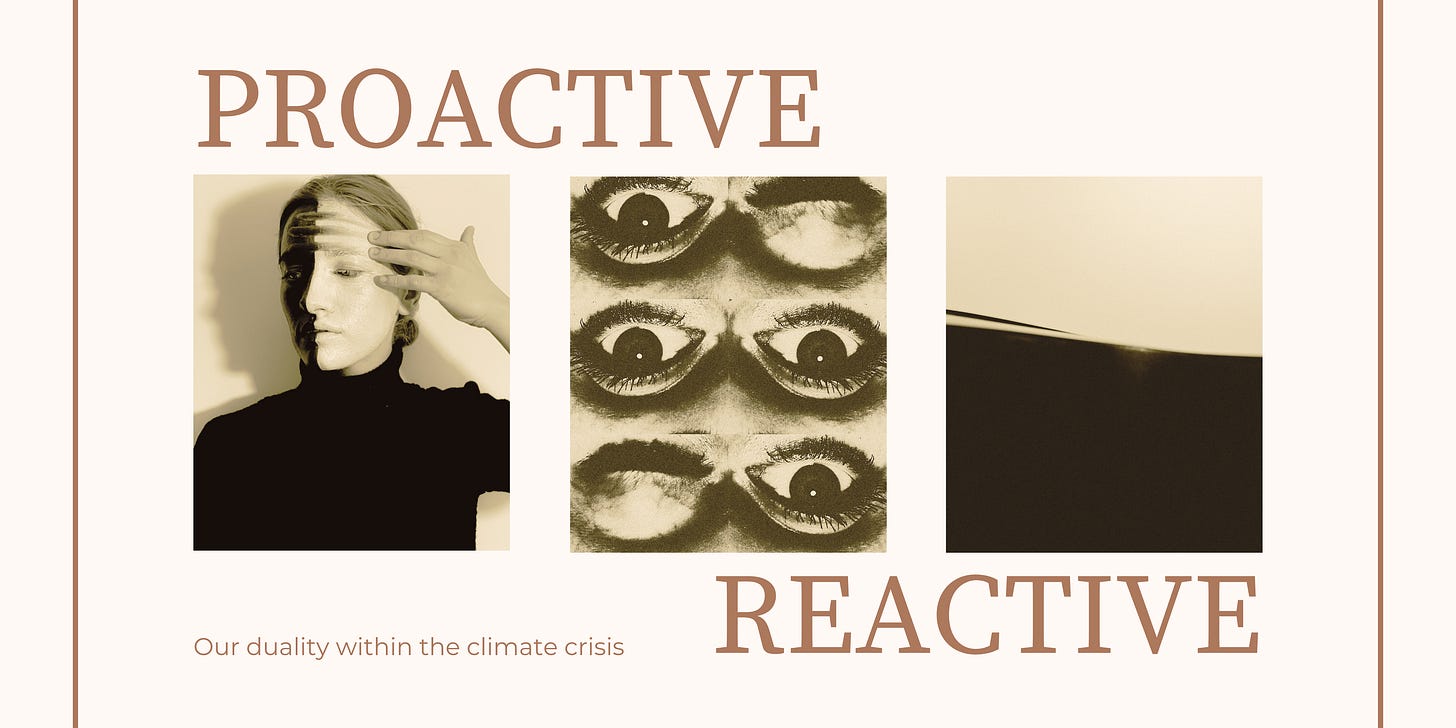Proactive vs. Reactive
Combat Climate Change Today
Save Our Happy Place is a climate action newsletter dedicated to making it easy for you to help protect the places you love from climate change, written by Lindsay Nunez. Read on for simple yet effective climate actions, and sustainable + eco-friendly lifestyle tips.
💚 SOHP is ad-free. We are community funded. If you enjoy our content, upgrade to a paid subscription.
Proactive vs. Reactive
Our duality within the climate crisis
Two Kinds of People
Up until recently, I truly felt like there were two kinds of people when it comes to the climate. Those who were adamantly a part of the climate movement, committed to saving the world, and riddled with hope and grief on the subject. Then there were those who chose to believe this is a far-off problem, both geographically and in terms of time. They were aware of the issue but felt little urgency. Despite the noise the media makes about climate deniers, I honestly have not encountered many. I’m aware of the ‘Brooklyn Bubble’ which I call home, but I do have lots of exposure to friends, family, and people outside of that bubble. Plus the data shows, most Americans are aware of and concerned about climate change.
Closer to Home
New York City recently set a record for the longest streak without snowfall in 50 years. A few weeks ago, while taking my daily walk through our neighborhood park, I noticed a flock of geese returning north almost two months early. My heart panged with grief for these geese when I saw the temperatures drop to well below freezing the next weekend. This sentiment has been shared by many. At a recent event, an acquaintance shared her distress for the confused animals having to readily navigate between 9 and 50 degrees Fahrenheit. To escape the freezing temps, a friend waited for her bus inside a liquor store. In a city notorious for not engaging with strangers, a man inside the shop unpromptedly asked her, “Did you know climate change means extreme weather patterns and not only getting warmer?“
The sentiment of acknowledgment and urgency is becoming more prevalent as the effects of climate change in our day-to-day lives become more evident. How have weather pattern changes radically affected your life and community?
Expanding proactive behaviors in a reactive state of affairs
In finding the motivation to keep up the good fight, it’s important to know, remember and share that we are no longer addressing climate change from a true place of proactivity. We, as a species, are being reactive. It is hard to ignore, deny, or view it as a distant problem at this point. People seem to be waking up to that.
Reactive Thinking waits for events to occur and then responds to them.
Proactive Thinking anticipates problems before they occur and actively seeks resolutions.
I’ve long touted that making combatting climate change a part of your life should come from a place of hope, optimism, and love for nature. But as the day-to-day effects of climate change become more chilling, how do we harness and expand proactive behaviors in a reactive state of affairs?
If proactive level thinking requires anticipating issues and acting accordingly, it makes sense that the best solutions forward are system-level changes to how we navigate this world. This means changing things like infrastructure, transitions to clean energy, better waste management, and lowering overall human consumption (especially in places like the U.S.). Essentially, addressing these systems before they completely fail us. Additionally, because we are already in a reactive state, our efforts will have to be split between repairing the damages already done and adapting communities for the change.
What Can I Actually Do?
The fastest way to address systemic issues is with systemic change. All politicians’ resolve to drive change depends on the demands of their constituency. The most powerful voice in this process still belongs to you, the individual constituent. With that in mind, I encourage you to become civically engaged in 2023.
Some Rays of Sunshine
Headlines We’re Happy to See
Solar-powered smart compost bins pop up across Brooklyn, NYC. - Read More
England will ban single-use plastic cutlery and plates in October. - Read More
New York City Council passed a bill to prohibit including utensils and plastic supplements in take-out and delivery orders. - Read More
The number of electric vehicles on Australian roads soars as demand exceeds supply. - Read More





